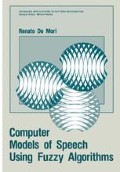Abstract
Task-dependent knowledge contains syntax, semantics, and pragmatics. Its purpose is the solution of ambiguities and recovery from errors which still remain at the lexical level. Furthermore, task-dependent knowledge may be used to transform the surface structure of a recognized sentence into its conceptual representation.
Access this chapter
Tax calculation will be finalised at checkout
Purchases are for personal use only
Preview
Unable to display preview. Download preview PDF.
References
Books by Feigenbaum (1963) and Minsky (1968) are a good introduction to knowledge representation.
Books by Ernst and Newell (1969), Sacerdoti (1977), Nilsson (1971), Chang and Lee (1973) are good references for problem solving.
Books by Newell et al. (1973), Reddy (1975), Dixon and Martin (1979), Walker (1978), Lea (1980), Cole (1980) Fain (1977), Zagoruiko (1976) give a good view of the state of the art in the design of Speech Understanding Systems. Of great interest for knowledge representation and control strategies for speech understanding are the final reports of the main contractors of the ARPA project (Walker, 1976, Woods et al.,1976, Reddy et aí.,1977) and the Ph.D theses by Erman (1974a), Paxton (1977), Lowerre (1976), Nakagawa (1976), and Quinton (1980).
Advances in this area can be mostly found in the proceedings of the International Joint Conference of Artificial Intelligence (IJCAI), of the American Association of Artifical Intelligence (AAAI), of the Conference of computational linguistics (COLING), ARSO (USSR), and in the American Journal for Computational Linguistics, Artificial Intelligence and Cognitive Sciences.
Author information
Authors and Affiliations
Rights and permissions
Copyright information
© 1983 Plenum Press, New York
About this chapter
Cite this chapter
De Mori, R. (1983). On the Structure and Use of Task-Dependent Knowledge. In: Computer Models of Speech Using Fuzzy Algorithms. Advanced Applications in Pattern Recognition. Springer, Boston, MA. https://doi.org/10.1007/978-1-4613-3742-3_8
Download citation
DOI: https://doi.org/10.1007/978-1-4613-3742-3_8
Publisher Name: Springer, Boston, MA
Print ISBN: 978-1-4613-3744-7
Online ISBN: 978-1-4613-3742-3
eBook Packages: Springer Book Archive

